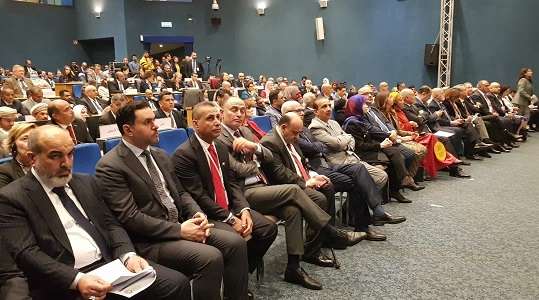The Arab Forum for Sustainable Development for the current year 2023, chaired by Yemen, represented by the Minister of Planning and International Cooperation, Dr. Waed Badhib, and organized by the United Nations Economic and Social Commission for Western Asia (ESCWA) at its headquarters in the Lebanese capital, the League of Arab States and United Nations bodies working in the Arab world, began in Beirut yesterday, under the title "Solutions and Action", and will continue until March 16, 2023.
The opening ceremony was attended by Deputy Secretary-General of the United Nations Amina Mohammed, Secretary-General of the League of Arab States Ahmed Aboul Gheit, Under-Secretary-General of the United Nations and Executive Secretary of ESCWA Rola Dashti, high-level delegations and representatives of Arab governments, regional and international organizations, civil society and the private sector, in addition to parliamentarians and academics.
The Secretary-General of the League of Arab States, Ahmed Aboul Gheit, delivered a speech in which he touched on the repercussions of the Russian-Ukrainian war on international peace and security, and on the Arab region in particular, where the ability of multilateral action to resolve conflicts has clearly declined.
"This war will hinder the international community’s efforts in dealing with other more pressing and important issues such as increasing poverty and the risks of climate change," he said.
The Secretary-General praised the existing cooperation between the League of Arab States and the United Nations Economic and Social Commission for Western Asia in achieving sustainable development goals, through the implementation of a number of joint activities, which aim to support and build Arab capacities in several areas, the most important of which is the preparation of the World Water Conference, to be held next week in New York, as well as the completion of the development and activation of the Arab ICT strategy, known as the "Arab Digital Agenda", as well as the preparation of the joint plan entitled "Arab Vision 2045".
The Deputy Secretary-General of the United Nations, Amina Mohammed, spoke about the faltering progress on the path to achieving sustainable development goals and even regressing on the path of some goals.
The triple effects of the planetary crisis of climate change, biodiversity loss, and pollution threaten food security and water availability, undermine resilience, and exacerbate conflicts.
"Inequality has exacerbated poverty, which has escalated in recent years to close to 50 percent in Arab least developed and conflict-affected countries. Food insecurity affected more than 30 percent of people in the Arab region in 2020, exacerbated by the COVID-19 pandemic, climate change and the war in Ukraine."
She stressed "the need to act now so that all these factors do not make the achievement of the SDGs beyond the reach of the region," stressing "the need for an urgent review of how to get the region back on track through policy decisions and investment."
The Yemeni Minister of Planning, Chairman of the Forum in its current session, Waed Badhib, spoke about the Arab region and the world as a whole facing two successive crises, the Covid-19 pandemic and the Russian-Ukrainian crisis, and the worrying repercussions that followed in food and energy prices and global economic stability. Referring to the humanitarian and economic crisis that Yemen is going through.
He reiterated that the government will continue to achieve some achievements in terms of sustainable development goals, as well as continuing the battle to restore the state and end the coup, end the state of conflict and fragility, work on the recovery of the economy and the reconstruction of infrastructure damaged by the war, as well as facing multiple crises and chronic structural challenges.
For her part, the Under-Secretary-General of the United Nations and Executive Secretary of the Economic and Social Commission for Western Asia (ESCWA), Rola Dashti, pointed out that "it is unacceptable for an Arab child to be born in debt of $ 3,500 due to the accumulation of the region's debt to $ 1.5 trillion," explaining that "about 30 million Arabs are unemployed and 160 million in the informal sector without social protection."
"The gender gap in the Arab region is the second largest gender gap in the world, as government policies overlook the blatant inequalities in Arab societies," Dashti said, adding that "the richest 10 percent of the population owns 75 percent of its wealth, while the middle class is shrinking, with about 30 percent of it becoming poor in some Arab countries in recent years."
Source (Union of Arab Chambers)

